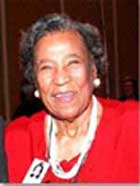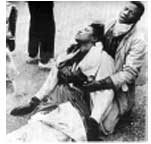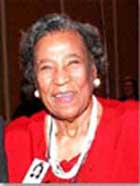
KINGSTON, R.I. –January 31, 2007—Amelia Boynton-Robinson, a veteran civil rights activist and Bernard LaFayette Jr., a distinguished scholar-in-residence and director of the University of Rhode Island’s Center for Nonviolence and Peace Studies, will talk about their shared experiences in the Civil Rights Movement on Tuesday, Feb. 13 at 7 p.m. Kendall Moore, URI assistant professor of journalism will facilitated the talk, which will be held in Independence Auditorium, Kingston campus. The conversation is free and open to the public.
Boynton-Robinson and LaFayette were linked together at a crucial time in this country’s history. Boynton-Robinson became a nationally recognized figure when she marched on March 7, 1965, also known as “Bloody Sunday.” She was gassed, beaten, and left for dead on the Edmund Pettus Bridge.
Her involvement in the Civil Rights Movement extends far beyond that tragic Sunday. She has long advocated for civil and human rights around the country, spending the 1930’s fighting for voting rights and property ownership for African-Americans throughout poverty stricken Alabama. 
During the 1960’s, Boynton-Robinson’s home and office became the center of Selma’s civil rights battles, used by Dr. Martin Luther King Jr. and his lieutenants including LaFayette, by Congressmen and attorneys from around the nation, to plan demonstrations that would lead eventually to the Voting Rights Act of 1965.
In 1964, Boynton-Robinson was the first female African-American to seek a seat in Congress from Alabama, and the first woman, white or black, to run on the Democratic ticket in the state.
As a centenarian, Boynton-Robinson continues to influence the development of civil and human rights throughout the nation, while maintaining a national and international speaking schedule.
Major sponsors for the conversation are the URI President’s Office, Honors Program and the Visiting Scholars Committee, and Center for Nonviolence and Peace Studies. It is co-sponsored by URI’s College of Human Science and Services; College of Nursing; Communication Studies Department; Women’s Studies Department; Department of Journalism; the Women’s Center, and the Sociologists for Women in Society.

